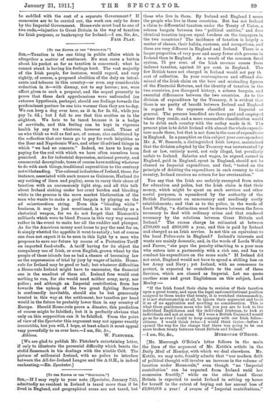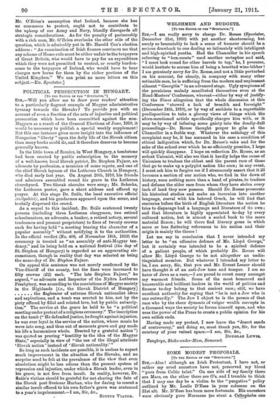[To THE EDITOR OP THE " SPECTATOR...1
SIR,—If I may reply to your note (Spectator, January 7th), admittedly no resident in Ireland is taxed more than if he lived in England, and geographical areas are not taxed, but
those who live in them. By Ireland and England I mean the people who live in those countries. But has not Ireland a claim to differential taxation under the Treaty of Union, a solemn bargain between two " political entities," and does identical taxation impose equal burdens on the taxpayers in the two countries P The incidence of taxation is largely a matter of classes, their habits, customs, and occupations, and these are very different in England and Ireland. There is a larger proportion of very poor and many fewer rich persons in Ireland than in England. As a result of the common fiscal system, 75 per cent. of the Irish revenue comes from indirect taxation, against 50 per cent. in England. The few British taxes not charged in Ireland would not pay th cost of collection. In your contemptuous and offhand dis-
missal of the Irish claim on the bare and misleading figures of the Fin--_-„cial Returns, and the identity of taxation in the two countries, you disregard history, a solemn bargain, and essential differences between the two countries. As to the
division of expenditure by the Treasury, it is evident that there is no parity of benefit between Ireland and England in regard to the expenses classified as Imperial or general. The persons benefited are those paid and employed
where they reside, and a more reasonable classification would be to debit each country with the outlay made in it. The
present plan is to debit Ireland with almost the whole expendi- ture made there, but that is not done in the case of expenditure in England. In a pamphlet on this subject your correspondent Mr. A. W. Samuels, a distinguished Irish lawyer, maintained that the division adopted by the Treasury was unwarranted by fact or law, entirely novel, not only illegal, but peculiarly unfair to Ireland. Salaries and wages, he argued, earned in England, paid in England, spent in England, should not be classed as Imperial expenditure, and that, " tested on the principle of debiting the expenditure in each country to that country, Ireland receives no return for her overtaxation."
You say that the Irish are unfairly exempted from rates for education and police, but the Irish claim is that their money, which might be spent on such services and other useful purposes, is squandered by the authority of the British Parliament on unnecessary and needlessly costly establishments; and that as to the police, in the words of
Lord Welby, "a distinction must be drawn between the force necessary to deal with ordinary crime and that rendered
necessary by the relations between Great Britain and Ireland." The excess charge he estimated at between £700,000 and £800,000 a year, and this is paid by Ireland and charged as an Irish service. Is not this an equivalent to the local Police-rate in England P Ireland's interests and wants are mainly domestic, and, in the words of Lords Welby and Farrer, "she pays the penalty attaching to a poor man
who enters into a partnership with a rich one, and has to conduct his expenditure on the same scale." If Ireland did not exist, England would not have to spend a shilling less on her Army and Navy ; yet Ireland, with no commerce to protect, is expected to contribute to the cost of these Services, which are classed as Imperial. Let me quote
another sane and great Englishman on this subject, Lord Morley :—
"If the Irish found their claim to revision of their taxation upon a great treaty, and upon the legal and constitutional position assigned to them under that treaty, it is wretched statesmanship, it is not statesmanship at all, to ignore their argument and treat it as of no application and meriting no consideration. This is what these gentlemen mean who tell you you are to look to the individual Englishman and the individual Irishman, to look at individuals and not at areas. If I were a British Unionist I would go as far as ever I could to keep company with our Irish fellow- citizens. I would think twice—I would think thrice—before I opened the way for the charge that there was going to be one more broken treaty between Great Britain and Ireland."
[Mr. Murrongh O'Brien's letter follows in the main the lines of the argument of Mr. Kettle's article in the Daily Mail of Monday, with which we deal elsewhere. Mr. Kettle, we may note, frankly admits that "our modern drift of political thought will involve an increase in the volume of taxation under Home-rule," even though "no 'Imperial contribution' can be expected from Ireland until her economies fructify," while on the other hand Great Britain is expected to assist Ireland in setting up house for herself to the extent of buying out her annual loss of £'2,000,0E0 a year I. A`propos of "Imperial -contributions," Mr. O'Brien's assumption that Ireland, because she has no commerce to protect, ought not to contribute to the upkeep of our Army and Navy, blandly disregards all strategic comsiderations. As for the penalty of partnership with a rich man, Mr. O'Brien overlooks the other side of the question, which is admirably put in Mr. Harold Cox's election address ; " An examination of Irish finance convinces me that any scheme of Home-rule must be either unfair to the taxpayers of Great Britain, who would have to pay for an expenditure which they were not permitted to control, or cruelly burden- some to the taxpayers of Ireland, who would have to bear charges now borne for them by the richer portions of the United Kingdom." We can print no more letters on this subject.—En. Spectator.]











































 Previous page
Previous page